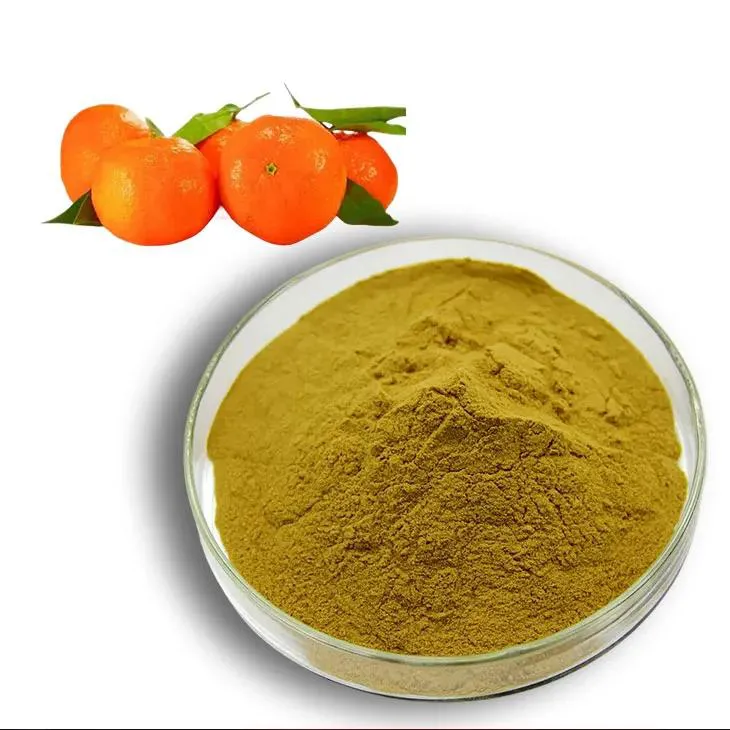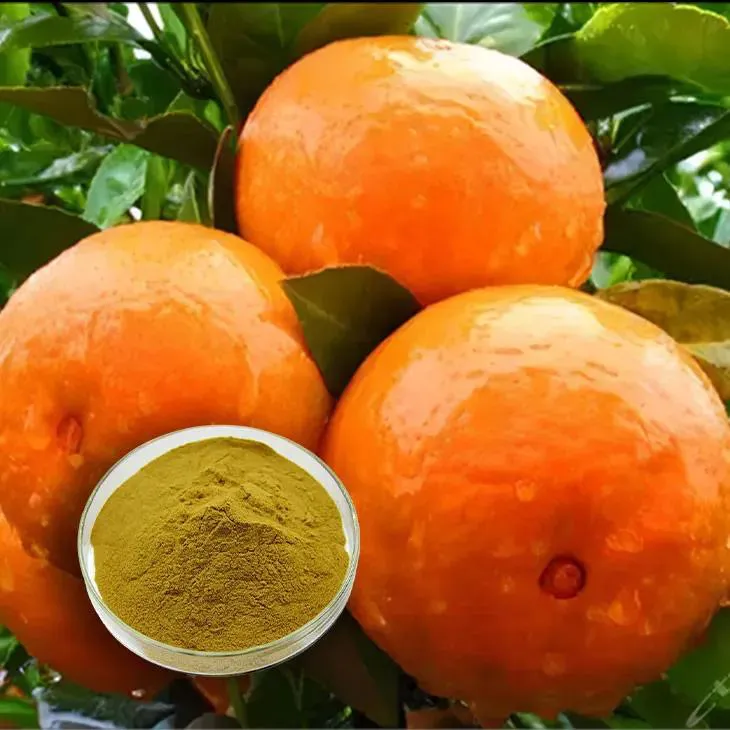- 0086-571-85302990
- sales@greenskybio.com
From Citrus to Health: A Comprehensive Guide to Citrus Bioflavonoids
2024-07-04

1. Introduction
Citrus fruits are a beloved part of many diets around the world. They are known for their refreshing taste, but their value goes far beyond mere flavor. Citrus fruits are rich in bioflavonoids, which are compounds that have significant implications for human health. This comprehensive guide will take you through the world of citrus bioflavonoids, exploring what they are, where they come from in citrus fruits, and the numerous health benefits they offer.

2. What are Citrus Bioflavonoids?
Bioflavonoids are a class of plant - based compounds that are widely distributed in the plant kingdom. In citrus fruits, they play a variety of important roles. They are often found in the peel, pulp, and membranes of citrus fruits. Citrus bioflavonoids are polyphenolic compounds that can be divided into several sub - types.
2.1 Flavonoids
Flavonoids are one of the main types of citrus bioflavonoids. They include compounds such as Hesperidin, naringin, and rutin. These flavonoids are characterized by their chemical structures, which typically consist of two benzene rings connected by a three - carbon chain. They are responsible for many of the health - promoting properties associated with citrus fruits.
2.2 Flavanones
Flavanones are a specific subset of flavonoids that are abundant in citrus fruits. Hesperidin and naringin are two well - known flavanones found in citrus. Hesperidin is particularly concentrated in oranges, while naringin is more prevalent in grapefruits. Flavanones are known for their antioxidant and anti - inflammatory activities.

3. Sources of Citrus Bioflavonoids within Citrus Fruits
Citrus bioflavonoids can be found in different parts of citrus fruits.
3.1 The Peel
The peel of citrus fruits is a rich source of bioflavonoids. It contains high concentrations of flavanones and other bioflavonoid sub - types. However, the peel is often discarded in many common consumption practices. This is unfortunate as it contains a significant amount of these health - promoting compounds. Some traditional medicine practices and modern research are now exploring ways to better utilize the peel, such as through the production of extracts or in the form of dried and powdered peel for use in supplements or in cooking.
3.2 The Pulp
The pulp of citrus fruits also contains bioflavonoids. While the concentration may be lower compared to the peel in some cases, it is still a significant source. For example, oranges and lemons have bioflavonoids distributed throughout their pulp. The pulp is more commonly consumed, which means that people are getting some of the benefits of these bioflavonoids when they eat citrus fruits in their normal form, such as in slices or as juice.
3.3 The Membranes
The membranes that separate the segments of citrus fruits also house bioflavonoids. These are often overlooked but can contribute to the overall bioflavonoid content of the fruit. When consuming citrus fruits, leaving these membranes intact can increase the intake of bioflavonoids.

4. Health Benefits of Citrus Bioflavonoids
Citrus bioflavonoids offer a wide range of health benefits.
4.1 Antioxidant Properties
One of the most important benefits of citrus bioflavonoids is their antioxidant activity. Antioxidants are substances that can neutralize free radicals in the body. Free radicals are unstable molecules that can cause damage to cells, proteins, and DNA. By neutralizing these free radicals, citrus bioflavonoids help to protect the body from oxidative stress. This oxidative stress is associated with a variety of health problems, including aging, cancer, and heart disease. For example, hesperidin has been shown to scavenge free radicals effectively, reducing the risk of cellular damage.
4.2 Anti - inflammatory Effects
Citrus bioflavonoids also possess anti - inflammatory properties. Inflammation is a natural response of the body to injury or infection, but chronic inflammation can lead to a host of diseases, such as arthritis, diabetes, and cardiovascular diseases. Flavanones like naringin have been found to reduce inflammation in the body. They can inhibit the production of inflammatory mediators, such as cytokines and prostaglandins, thereby helping to keep inflammation in check.
4.3 Cardiovascular Protection
- Citrus bioflavonoids are beneficial for the cardiovascular system in multiple ways.
- They can help to lower blood pressure. For instance, hesperidin has been shown to have a vasodilatory effect, which means it can relax the blood vessels, reducing the resistance to blood flow and thus lowering blood pressure.
- These bioflavonoids also play a role in reducing cholesterol levels. They can interfere with the absorption of dietary cholesterol in the intestines and promote the excretion of cholesterol from the body. This helps to maintain healthy cholesterol levels, reducing the risk of atherosclerosis, a condition in which the arteries become narrowed and hardened due to the build - up of plaque.
- Furthermore, citrus bioflavonoids can improve endothelial function. The endothelium is the inner lining of blood vessels, and proper endothelial function is crucial for maintaining cardiovascular health. By improving endothelial function, citrus bioflavonoids help to prevent the development of cardiovascular diseases.
4.4 Other Health Benefits
- Citrus bioflavonoids may also have anti - cancer properties. While more research is needed in this area, some studies have suggested that they can inhibit the growth and spread of cancer cells. For example, certain flavonoids have been shown to interfere with the signaling pathways that cancer cells use to proliferate.
- They can also improve immune function. By enhancing the activity of immune cells, such as macrophages and lymphocytes, citrus bioflavonoids help the body to fight off infections more effectively.
- Moreover, citrus bioflavonoids may have a positive impact on cognitive function. Some research has indicated that they can protect the brain from oxidative damage and inflammation, which are associated with neurodegenerative diseases such as Alzheimer's and Parkinson's.
5. Incorporating Citrus Bioflavonoids into Your Diet
There are several ways to ensure that you are getting an adequate amount of citrus bioflavonoids in your diet.
5.1 Eating Whole Citrus Fruits
One of the simplest and most natural ways to get citrus bioflavonoids is to eat whole citrus fruits. This includes oranges, lemons, limes, and grapefruits. When you eat the whole fruit, you are consuming all the parts that contain bioflavonoids, including the peel (if it is not too bitter), pulp, and membranes. For example, you can eat an orange by peeling it and eating the segments, including the white membranes, to maximize your bioflavonoid intake.
5.2 Drinking Citrus Juices
- Citrus juices are another popular way to consume citrus bioflavonoids. However, it is important to note that many commercial juices may have been processed, which can sometimes reduce the bioflavonoid content. To get the most benefit, it is advisable to choose freshly squeezed juices.
- When making citrus juice at home, you can include the pulp and some of the membranes to increase the bioflavonoid content. For example, making fresh orange juice with a small amount of pulp can provide a good amount of bioflavonoids.
5.3 Using Citrus - Based Supplements
- Citrus - based supplements are available in the market. These supplements typically contain concentrated forms of citrus bioflavonoids, such as hesperidin or naringin extracts.
- However, it is important to consult a healthcare provider before starting any supplement regimen. Supplements should not be used as a substitute for a healthy diet but can be a useful addition for those who may not be able to consume enough citrus fruits regularly.
6. Conclusion
Citrus bioflavonoids are an important component of citrus fruits that offer a plethora of health benefits. From their antioxidant and anti - inflammatory properties to their role in protecting the cardiovascular system and potentially preventing other diseases, they are truly remarkable compounds. By incorporating citrus fruits into our diet in various ways, whether it is through eating whole fruits, drinking juices, or, in some cases, using supplements, we can take advantage of these health - promoting bioflavonoids. As research in this area continues to expand, we may discover even more benefits associated with citrus bioflavonoids in the future.
FAQ:
What are citrus bioflavonoids?
Citrus bioflavonoids are a group of compounds found in citrus fruits. They are secondary metabolites and have various biological activities. They contribute to the color, flavor, and aroma of citrus fruits, and are also important for human health due to their antioxidant, anti - inflammatory, and other beneficial properties.
What are the main types of citrus bioflavonoids?
Some of the main types of citrus bioflavonoids include hesperidin, naringenin, and Quercetin. Hesperidin is commonly found in oranges and lemons, naringenin is abundant in grapefruit, and Quercetin can also be found in citrus fruits among other sources. Each type has its own unique chemical structure and potential health effects.
How do citrus bioflavonoids act as antioxidants?
Citrus bioflavonoids act as antioxidants by neutralizing free radicals in the body. Free radicals are unstable molecules that can cause damage to cells, DNA, and proteins. Bioflavonoids donate electrons to these free radicals, thereby stabilizing them and preventing them from causing oxidative stress. This helps in reducing the risk of various diseases associated with oxidative damage, such as cancer, heart disease, and neurodegenerative disorders.
Can citrus bioflavonoids help with inflammation?
Yes, citrus bioflavonoids have anti - inflammatory properties. They can inhibit the production of inflammatory mediators in the body, such as cytokines and prostaglandins. By reducing inflammation, they may help in alleviating symptoms of inflammatory conditions like arthritis, and also contribute to overall health by preventing chronic low - level inflammation that is associated with many diseases, including cardiovascular diseases and diabetes.
How can one incorporate citrus bioflavonoids into their diet?
One can incorporate citrus bioflavonoids into their diet by consuming a variety of citrus fruits such as oranges, lemons, grapefruits, and limes. These can be eaten fresh, juiced, or used in cooking and baking. Additionally, some dietary supplements containing citrus bioflavonoids are also available, but it is important to consult a healthcare provider before starting any supplement regimen.
Related literature
- Title: Bioflavonoids in Citrus Fruits: Composition, Biological Activity, and Health Benefits"
- Title: "The Role of Citrus Bioflavonoids in Cardiovascular Health"
- Title: "Antioxidant and Anti - Inflammatory Properties of Citrus Bioflavonoids: A Review"
- ▶ Hesperidin
- ▶ citrus bioflavonoids
- ▶ plant extract
- ▶ lycopene
- ▶ Diosmin
- ▶ Grape seed extract
- ▶ Sea buckthorn Juice Powder
- ▶ Beetroot powder
- ▶ Hops Extract
- ▶ Artichoke Extract
- ▶ Reishi mushroom extract
- ▶ Astaxanthin
- ▶ Green Tea Extract
- ▶ Curcumin Extract
- ▶ Horse Chestnut Extract
- ▶ Other Problems
- ▶ Boswellia Serrata Extract
- ▶ Resveratrol Extract
- ▶ Marigold Extract
- ▶ Grape Leaf Extract
- ▶ blog3
- ▶ blog4
- ▶ blog5
-
Grapefruit Seed Extract Powder
2024-07-04
-
Cranberry Extract
2024-07-04
-
Senna Leaf Extract
2024-07-04
-
Pueraria Lobata Extract
2024-07-04
-
Oyster Mushroom Extract Powder
2024-07-04
-
Red Date Extract
2024-07-04
-
Sea buckthorn Juice Powder
2024-07-04
-
Black Pepper Extract
2024-07-04
-
Calendula Extract
2024-07-04
-
Fenugreek Extract Powder
2024-07-04





















